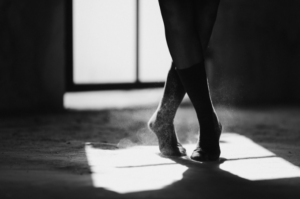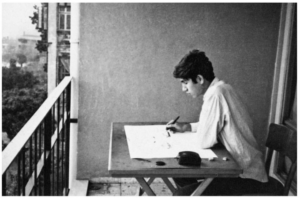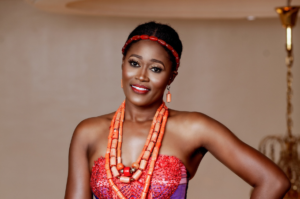
“He has escaped us,” his cousin said, as if catching him was something that we never got around to.
I didn’t imagine saving him, even at the height of my co-dependent hubris, but I had stayed close by, in case I could catch him as he fell. Of all our memories, what I can trust to bring on stinging tears, is a conversation in Alcoholics Anonymous. He had said, “I would have to make amends to the people I hurt”. The considerations that hold us back say everything.
“But he’s fine,” I say to my friends whose reaction to the news is more appropriate than mine. “He can finally sleep.”
“It’s a relief for him and peace for the rest of us.”
A confused expression stops my monologue, and I send him a small mental apology.
“I didn’t mean it, Melaciye.”
“Please don’t go.”
“Heaven, even with her there, would bore you.”
Melac and Mimi. There was no space in their childhood or adulthood to grow independent identities, and even at his funeral, her name was called out as often as his in the rise and fall of grief-wailing. At the mourning house, I try to make myself useful without intruding, worried needlessly that their remaining sibling might not recognize me, by which I meant that I had loved Melac with no official title. I introduce myself to the aunties as a close friend of the twins, the words small in my mouth. What was I to him? How do you mourn when you are not sure what it is you were to the newly departed?
Amiour is what he called our twenty-year pick-up romance that fit in easily between other relationships, a marriage, bringing children into the world, and stunning losses. Our friends weren’t surprised to see us together after my divorce, and indulged my pretense that Melac could be in a relationship with anyone except the grief that he wore like a tired jacket. He needed me but couldn’t focus on us. I cried with him some nights, and talked him down others. I have looked back on those days of high drama and wondered at myself, but now I’m happy that I had lavished him with expectant affection, reading meaning into his smallest gestures. If he made an effort to clean up before he picked me up, I imagined blending our small families, and I was unreasonably touched when he put out cheese and wine for my visit. I once drove to another city to spend a few hours in his hotel bed, driving back home at dawn. “You deserve so much more,” I had told myself, but now I know what it was all for. Melac may have had many doubts in his life, but my love wasn’t one of them.
There’s a cruel expression in Amharic for those who won’t be traveling the distance, those like Melac: “ቅርብ ወራጅ” – “[He is] getting off soon”. I now hate that no one asks how he died, like his predictable end doesn’t deserve that courtesy, as if he couldn’t have died of blameless reasons. I bristle when my mother notes kindly, “So, he had problems,” and I offer her too much information, as if I had been there when it happened.
“He wasn’t alone, his cousin was with him.”
“It’s not like he was found dead at home.”
“He died in the hospital. A burst appendix.”
“Organ failure, probably starting with the liver,” clarifies his old roommate who is now a surgeon, and I snap at him in my head. “Who asked you?” But I had asked him.
I haven’t been able to cry, except for a few loud sobs as his cousin described kissing his still-warm forehead. I wish I had been so lucky. To have said a proper goodbye. In Amharic, we say, “አልወጣ አለኝ” – “I can’t get it out”, grief like this, a mourning that is sitting in too deep to properly shape into wails or sobs, to air into relief. I was never good at that Ethiopian art but could in the past at least follow when older women lead the crying. I now idly wonder why my generation gave up on the hyperbolic grieving of the past, shorn heads and hands beating the chest. Extraordinary loss deserves embarrassing performances while I wake up in the middle of the night, reaching deep to scratch at a loss that I can’t yet reach.
In the first cold days after his death, I hold my children’s sleeping bodies for comfort, but their waking hours fray my nerves. “But he died three days ago,” complains my son, unbelieving that I can still be so sad. “All you care about is Melac.” Eight years ago, my ex-husband and I had rescheduled his christening when Mimi had died two days earlier, and I had kept count of the years that she was gone with his birthdays, another bittersweet connection to Melac and his family.
My mind returns to this latest of griefs, and I move swiftly from giving in to despair to an accented desire to live a good life, to eat, love and laugh your share too. To walk in health like you hadn’t in years, to be the exceptional parent that you could have been. I try to get used to your absence in this world, to remember that there were many months and even a couple of years where we had lost complete touch. I had listened to your stories of Brazil and Japan, amazed that I didn’t know that you had been so far away from me, when we would always pick up right where we left off.
I later on watch my daughter line up her pretty pots of potions and pencils, and think, “little girls need time to grow into the saving graces that everyone willed your daughters to be.” Your eldest is old enough to have given you a glimpse of sweet fatherhood, but the little one won’t even remember you. When you first became a dad, I told you, “See, Mimi has sent you a baby girl who looks just like herself,” although I was not sure if Mimi would have ever learnt to share her twin-soul. I was friends with Mimi, in all her complicated ways, and in recent years, you liked the fact that I wasn’t afraid to mention her regularly. Everyone avoided looking at her name, tattooed in bold on the side of your right arm, but she was present in our conversations, as wild and irresponsible as you. Mimi, who took money out of the pockets of your baggy pants at the club, and who walked in on you in the bathroom. You never grew apart like siblings do, and I didn’t understand your surprise that she had you as her next-of-kin. I often imagine you on that nightmare of a long flight home after the US Embassy in Addis called you with the awful news that she had died instantly when her car crashed a few kilometres from your childhood home.
Everyone had walked on eggshells around you since her death, and when I realized that the mother of your children hadn’t known her, I knew that your relationship would not last.
You had laughed at me when I had offered to be your last love, but it seems that I was destined to be just that. Perhaps you had thought that you would grow old, to go through many more loves, but rebels without a cause seldom get to grow old, and I now know the soul’s capacity to take leave of what it will soon be without. I called you at lunchtime on a Tuesday a few months ago, knowing you will be available to pick me up immediately, and not return home until the next day. We talked like old times, recapped the last twenty years as if we knew that it would be for the last time. I loved it for me, that I let you disappear again after a courtesy dinner the next evening where you were the charming version of yourself, finally accepting your ways. You called me out of the blue a few weeks after and asked, “Are you okay?” I replied, “I’m okay.”
You and I. Amiour.
We were once kicked out of church for laughing, and we knew how to turn our dusty hometown and a North American city into sites of adventure on weekday afternoons. Walking aimlessly in Boston, we joined a long line of women and men in West African dress, and we were elated to catch a rare performance of the Senegalese national ballet. In my first week of graduate school, you woke me up at 6am to take me to Six Flags but I didn’t know what Six Flags was, and I hadn’t wanted to miss class. My college was in a seedy neighborhood, and a sex worker propositioned you and your friend as you parked outside my door. For the rest of our lives together, we would randomly throw out, “Ten Dollar Blowjob!” and howl in laughter as if at a new joke.
I got lost in your large city one time, and you found me, hugging me close, you more frightened than I had been. Even then, our status was nebulous, never quite dating, our affection for each other easily accepted by your twin and your close group of friends. When we were dating other people, we would sleep in the same bed like siblings and you once woke to find me crying, embarrassed at my homesickness, holding me and kissing my cheeks dry. It pleased me that Mimi had wanted me to be your girlfriend, and when your cousin told me a few years ago that I had once been referred to as ‘Melac’s wife’ in that home, it was a rare gift, a coming-in from the cold. So, your exceptionally close family had approved of me. A brief centering of the marginal role that I had occupied in your life. “Can you imagine us married?” I had said to friends, “he would have driven me crazy!” as if you had asked, as if you could have handled even a relationship.
I laughed at my own awkwardness at your funeral, almost mockingly. Do you wish you were the widow? Would the conferring of that status have been enough validation that Melac had loved you? You had said you did after all, exactly once in twenty years, and I had stared back at you stupidly.
You had danced at my wedding party a decade ago but were strangely jealous when you saw me on a date a few months before you passed, even though we were again ‘off’ by then. “You can ask me anything you want to know”, was the last thing I said to you, and you looked away. Earlier, you had casually mentioned that your second baby was on her way, not even watching my face for a reaction – you had always had a child’s sense of entitlement and of complete honesty. “I need to stop this completely, before the third baby arrives,” I had told my best friend, and he had laughed, knowing that I wasn’t stopping anything.
I have no regrets as far as Amiour goes, and I would have uprooted my life for you. The closest we got to playing house was an 11 pm call from a bar when you had said, “I’m coming home,” followed by the quick realization, “but we don’t live together.” If we had been given time to appease your demons, I would have built up my collection of your shapeless t-shirts that I sleep in now, and maybe one day, we would have shared a home. Our kids would have been hyphenated-siblings and I would have gone without so much if it had meant going to bed with you every night and having you actually sleep. Proximity to the space between your sad eyes, and to your impossible generosity. To your laughter and the way that you had loved your twin-soul.
I never allowed myself to feel sorry for you, and frequent distances helped maintain a more wholesome image of you and of Amiour. About a year before he died, I had looked at our flabby bodies reflected in each other on the mattress that he kept as a bed, and wondered at how quickly middle age had come upon us, and I learnt to let you go when I could no longer reach you. I cried when, after you had called me over one evening, you passed out mid-conversation, and I realized that you didn’t even know that I was there. It’s telling that as close as we were, you never met my kids, and I consoled myself with the thought that when you would finally be well enough to want to, you would love them easily.
Yesterday, I told my daughter as I was bathing her that I’m grieving for you, and that I will be for a while. She replied with wisdom that gave me pause. “Mama, my friend Desta says that death is God taking away a person’s pain.”
You weren’t the sobering type. You resisted being okay, even while dreaming of being a good father to your little girls. In the many years of 4 am calls where I couldn’t make out your words and only heard your rage, your own death was not the worst of my fears. I was relieved when the mother of your children left with the babies, hopeful that a disaster had been averted. The effort to heal would have been more than you could give, and you would have hated to be the lapsing cliché, a danger to his family, or worse, an embarrassment. Pity would have killed you a slower death, so perhaps this quick departure was the saving grace of a tragedy that was set in motion eight years ago. You had tried to live for Mimi too, like you said that you would. She didn’t get to be a parent, and you were going to live to raise your girls. That was the plan, but Mimi couldn’t have lasted this long without you either, and she is probably impatiently waiting for you. I know that you gave surviving your twin your best possible shot, but it was just too hard. This is God taking away your pain, it is ultimately an act of mercy. You are going home to Mimi, Melaciye, and I’ll be here, loving you from the margins.
Amiour.
Photo by Yaroslav Shuraev from Pexels










Elizabeth W Giorgis April 10, 2022 03:34
I love the article Amiour. It is so beautifully written and it touched our own vulnerabilities. I shared it with so many people and I received so many response. I read it so many times, and each time I read it, I saw the layers of womanhood in the margins of conventions. And being from Ethiopia myself, how else could love and loss and convention be described than through the author's lens? Wow!!